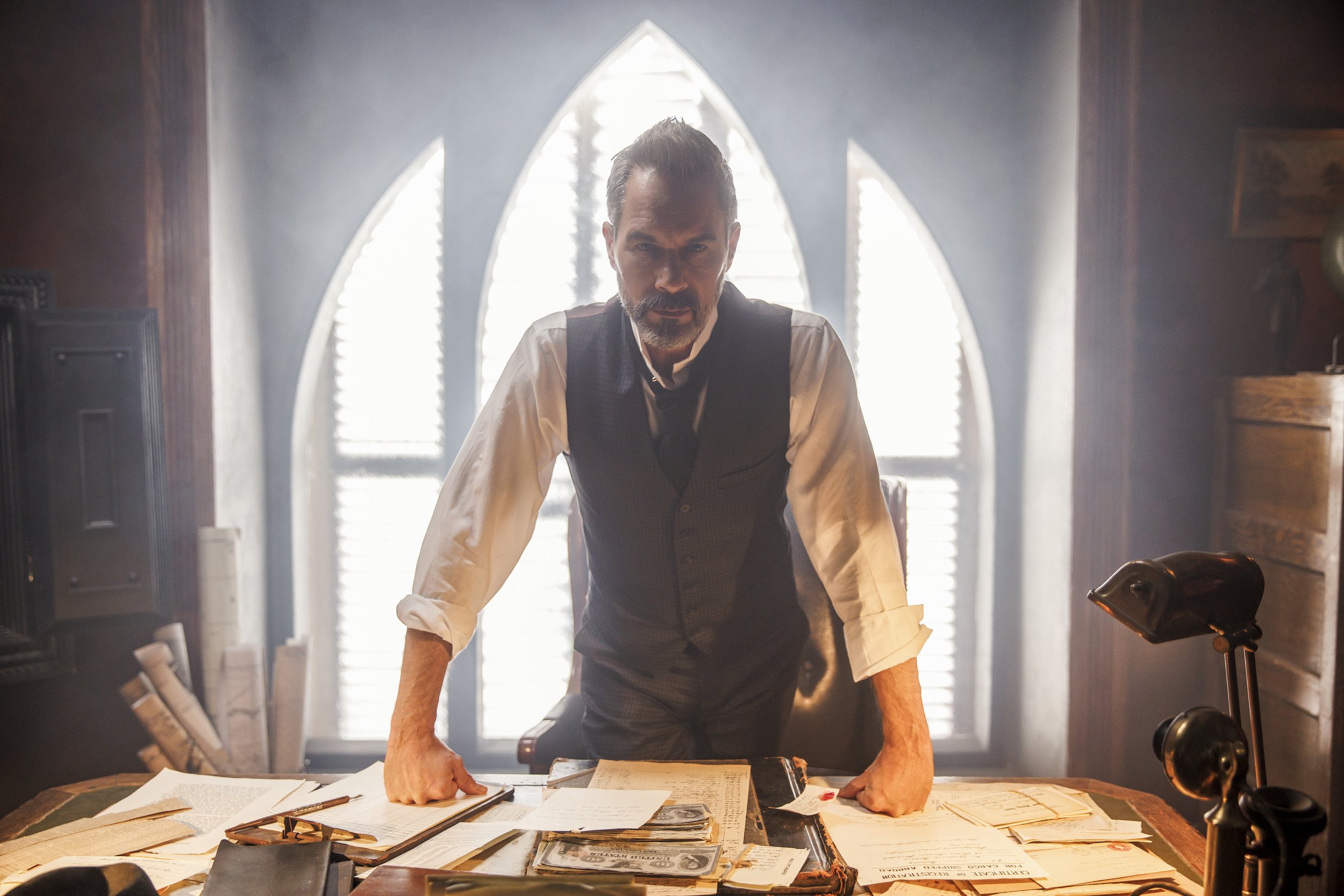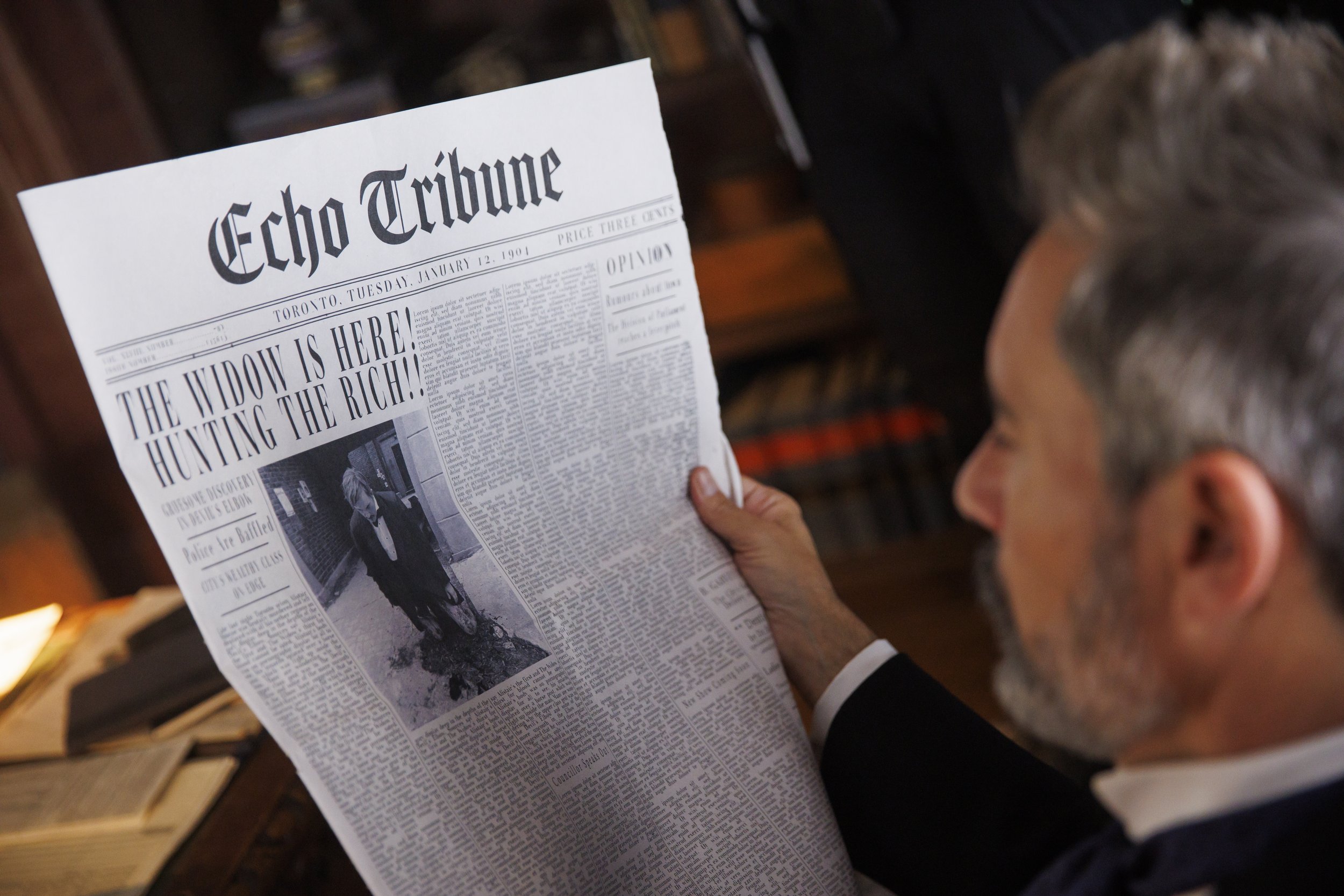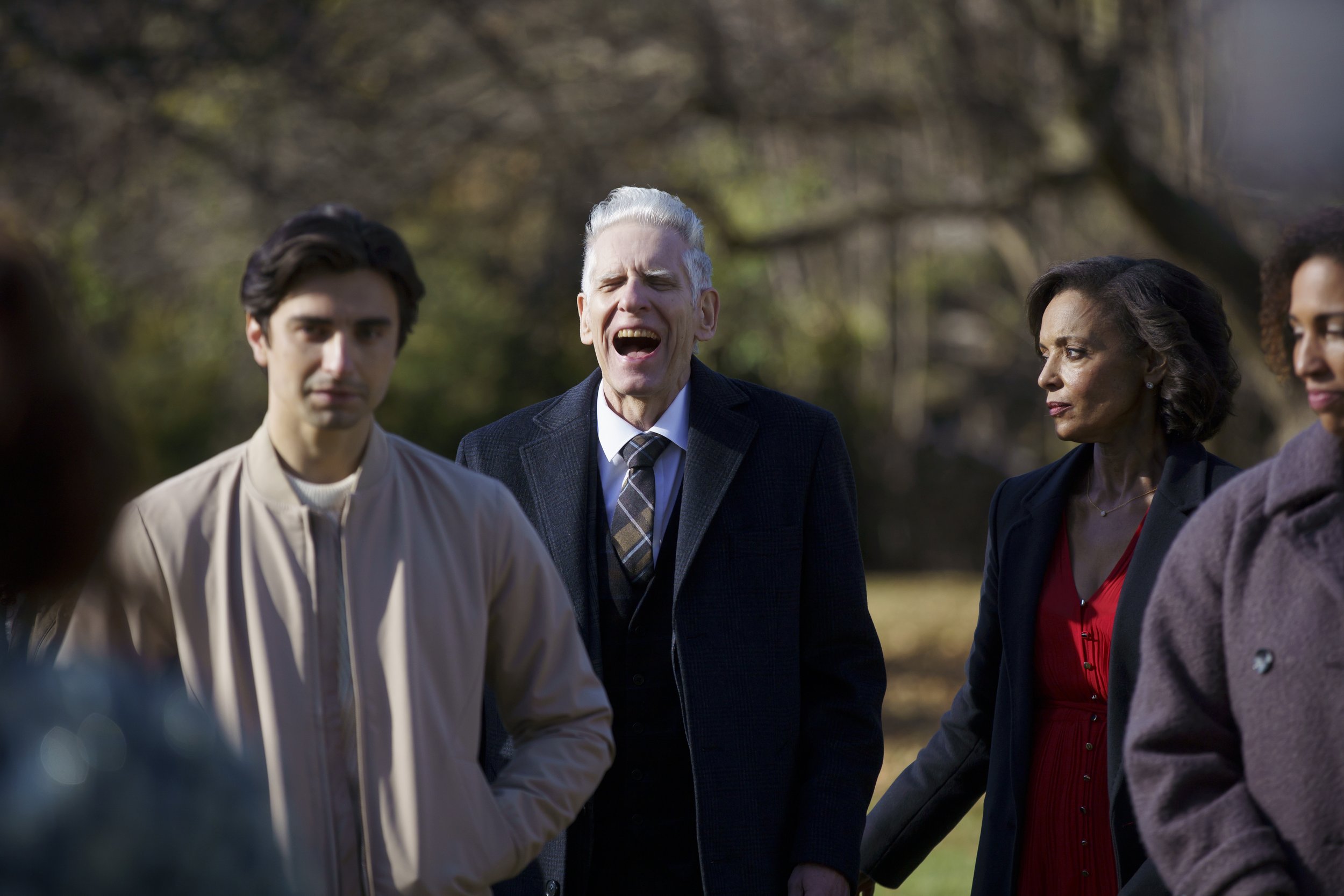[Exclusive Interview] Slasher TV Creatives Talk Cronenberg, Inventive Kills and "Flesh and Blood" and "Ripper"
Slasher is a Canadian anthology series of self-contained mysteries where a collection of characters are at the mercy of a masked killer stalking them one by one. Created by Aaron Martin (Degrassi: Next Generation, Being Erica, Another Life,) Slasher brings the twists, murders, and the blame game that fans crave emphasized via homages to classic and deep cut films of subgenre.
The events of Ripper shift us to the late 19th century during the industrial revolution where a killer coined “The Widow” is stalking the streets in search for blood of the rich. Only newly promoted detective Kenneth Rijkers is able to stop them, however, Rijkers’ own beliefs in justice could be his downfall.
Eric Mcormick (Will and Grace) joins as an oil baron tycoon who has charisma and self serving intentions for the ever-changing world.
In a previous interview for Bloody Disgusting, I spoke with showrunner Ian Carpenter about their time and process of crafting Slasher: Solstice. Adam Mcdonald (Pyewacket) returns again as director for all episodes with Ian doing his second round of show running for the series.
Below I chat with Ian and Aaron about the upcoming season as we dive into some gory, juicy tidbits about Ripper and Flesh and Blood!
Ian: Alex, I don't want to put pressure on you, but this is going to be our first Slasher: Ripper talk.
Alex: Really?
Ian and Aaron: Yep. Yeah
From what you’ve mentioned on social media audiences should expect both behind/front of the camera reunions. What was it like getting to have old and new crew/cast back?
Ian: It's amazing. It's amazing when you're building a team. In some ways, people don't give credit for or get credit in “genre.” A show like ours really demands a lot of key craftspeople. Everyone from Adam McDonald, who's a spectacular director, and we're so lucky to have him direct the last 24 episodes of the show. Getting our DOP back from Flesh and Blood, Scott McClellan was just incredible. Bringing back production designer, Brian Garvey, and bringing back Jessica Mary Claton, who designs wardrobe and has designed so many of the killers that people love. We just have a shared awareness and aesthetic that we're all chasing and pushing. When you get to the cast in this season, and I don't know if there's any we're going to drop, but I counted at one point it's over, partially because we have such a large cast this year, at least 20 returning actors. Sometimes it's people that had tiny parts, sometimes there's people that had big parts that agreed because of this kind of family vibe. They know what fun we will have. They know what a budget is for the fans, just like last year, when Amber (Joanne Vannicola) showed up on Flesh and Blood. Because we expanded or confirmed the universe. So all those things are just so much fun for us and everyone involved.
Aaron: The actors know that if we don't have a big part for them this year, it has nothing to do with them. It just has to do with the characters we've created and what we need for them. If we can have subsequent seasons, they're more than likely to have a much bigger part or maybe they'll come back for a cool cameo.
Thematically wise, tackling this specific time period made for many interesting comparisons/parallels for modern day and a past that still haunts us- what were some themes and elements you utilized for this entry?
Aaron: I think the biggest one, and it's just magnified in the past is the idea of class divisions. One-hundred years ago, class divisions were just in your face. People who are upper class did not care about the lower classes whatsoever. Nowadays, it's becoming the same thing. We've got 1% of the population holding all the money and really not caring about what's happening to the 99% of everybody else. So that's a huge theme in the season.
Ian: I think to COVID. Our show has nothing to do with COVID. But COVID really underlined it. Oh, do you have a job? Do you possibly have a partner or a family that you can share your rent with, like, you know, you're having such a different experience than the people that are working in high risk situations, getting sick all the time, blah, blah, blah, all that kind of stuff. I felt like it really made it clear to us all the ways in which you're lucky and and possibly the ways in which you're unlucky in all of this.
For the first time in show history the costume is actually of a female-slasher. What were the inspirations and homages you pulled for in order to craft their look and kill style? Did these also alter the physical presence of the killer?
Aaron: I don't think we can answer too much of that. But I think we can say that she's definitely not dainty.
Ian: Just because the killer is called “The Widow” doesn't mean they’re a female. I'm very interested in that as far as cosplayers because the show has some pretty rabid cosplayers. How that goes for them. Their presence is affected in ways we won't be specific, but definitely the way that the killer moves, we're pretty excited about some things that are new.
The show has always incorporated practical, gory, and inventive special effects for the kills as much as possible. How was carrying that vision and want after moving to Shudder for Flesh and Blood and now Ripper?
Aaron: It really is about making sure that the kills match the tone of the seasons. This season is very much a stark Victorian murder mystery and so our skills have to fit into that field and look.
Ian: I never felt limitations. I feel like we're always with those guys “talking story,” and they know horror better than anyone. We have seasons that are crazy gory, and other ones that are more maybe a little bit more about scares and “out of frame.”
Last season, Flesh and Blood, featured a Knives Out style massacre of a family corrupted by money enraptured in a twisted game that brings out true colors. How is this intricate exposure of human interaction explored in Ripper?
Aaron: The great thing about period is that you can instantly show rich and poor despite how they're dressed. There's such a clear delineation between the “haves and the have nots.” You'll immediately see that that theme played out just visually.
Ian: There's the parts of town like the Devil's Elbow, which is named after a real place. That was the sort of shady part of town in, I think, Victorian era Toronto. It's where people come to do certain things, be it drugs, sex, booze, whatever. So it reveals there's the folks that live there that live that honest life, and then there's the folks that have this sort of pretension. The wardrobe and houses disguise all of that kind of stuff. So there's a real sense of decorum honesty. And then when you put violence into all that… how all that is dealt with, denied, embraced?
Returning to direct is Adam McDonald. Explain how it was getting him back again for a third round and how it heightened production.
Ian: It's kind of like Aaron and I getting to keep working together. There's just a short form. There's a deep understanding of what we're doing. There's a desire to talk about things. We're so lucky on the show that it's a brand new look, feel, vibe, thematic focus, characters, and plot every season. We make it in ways that we don't want to spell out. You could see it in season four, Flesh and Blood, when we suddenly went, “Oh, we're gonna do a whole pile of really still [wide shots].” What does that do to our storytelling, you know? Adam wanted to experiment with that. So there's just so much pleasure for all of us in playing within that and sort of stretching the form of the show while adhering to it. We all just feel so lucky to get to do that.
Aaron: I hate when people say the word, but he does “elevate” our scripts, because he's true to what the scripts are. He adds a special Adam-ness to them.
Ian: Yep. He's so good with that (building tension.) He's so good with character and story. That's a large part of what we're doing at times in the show. So it's a perfect marriage.
Aaron Martin has been a showrunner and creator for numerous cult and hit shows that expand many genres- what are some showrunning lessons you have learned from him during this experience?
Ian: I was really fortunate in season three. I've said this to many people within the industry that it felt like showrunner school, because he was there very much at the start. Then he got busy with Another Life. I was on my own, which is good, I guess, to be tested that way. He was always available on the phone or via email. So I could sit there for the things I had no idea about and he could set me up. I think a lot of it is about protecting the vision and the story.
The series has created in house scream queens and recurring icons, but a major known love across fandom is Paula Brancati. What qualities and attributes do you feel have made her an embraced scream queen and final girl that resonates with fans?
Aaron : I think it's because she's kind of fearless and is willing to do pretty much anything- even if it's ridiculous and makes her look silly. She did that on Being Erica too, she's always been just gamed to do it. We can make her be a really nice person, like she was in season four, or we can make her a horrible person like she was in season three. She's really such a talented actor that she's able to make all those different versions of her characters feel authentic. Every time an actor comes back, they're playing a completely different part than what they’ve done before. Maybe it's because the first time in season two, she was covered in so much blood at the end- that cemented her status. When she was bathed in blood, and I saw the rushes (dallies) I was like, I think maybe we did a little too much. But let's go for it. It's funny. A lot of our actors up here (and all actors) do get typecast. So they don't get to play. If they look a certain way, they don't get to play the good guy, or they don't get to take the romantic interest. We just kind of don't care about that stuff. We give them roles against type as much as we can.
The staples of a “typical” slasher movie are always prevalent- can we assume as The Widow stalks the streets we will see more inventive kills/chases? How was utilizing the time period aspect when it came to kills or weapons?
Ian: It will. Yes, for sure. You're gonna see inventive kills. We're always trying to push that with ourselves. There's some cool weapons that it introduced- kind of can't talk about that too much. It's part of how it was written and all that kind of stuff. Not that you didn't feel that in Flesh and Blood, but we had some very cool environments to put things in. It's interesting that you mentioned chases, because I feel like that's an exciting element in this season. Again, connected back to your question about movement and all of that. We don't have a city, but we have a city and everything that goes in it like-
Aaron: Man, horses.
Ian: Yeah!
Aaron: We don't have cell phones to worry about because cell phones are the death of all slasher movies. We don’t have to worry about that.
Concerning the House in Flesh and Blood- was that a real island?
Aaron (instantly): No. House is smack dab in the middle of a very blue collar city.
Ian: It has rumors of it being haunted as well.
I’m sure many departments had to do research, but can you tell us how the writers room tackled this era?
Aaron: Think we did well, I think going in he and I were very much of the mind that we didn't want them to speak “too period.” We just don't want them to sound like they're in a Masterpiece Theater episode. So we didn't really worry too much about that.
Ian: I think some of the things we were really interested in came from research and awareness and all that. It's an exciting time for what's going on in medicine. What's going on with the body, the awareness of the body, the disregard for the body. The impact of poverty on the body, what's going on in “theater”; and the sort of excitement around the paranormal at that time. So all of that stuff was very alive. We were excited to get to play with all those things that were very much a mainstay of people's experience.
Aaron: Spirituality was huge, not religion, spirituality.
Ian: You felt this with the Ripper murders in London. There was photography of crime scenes showing up in papers, there was the Penny Farthings (high wheels) were these sensationalist things that people were, you know, pulpy, almost horror focused things that people were gobbling up. It almost felt like a pro-horror time. Really, if you think about it.
Last time we interviewed, it was for Solstice which also launched during the height of our (then) modern-day slasher renaissance. With Ripper releasing during another high crux of the sub genre interest and resurge- how does it feel? Did you guys even predict that slasher movies are coming back into the zeitgeist?
Aaron (instantly): I mean, if we had that ability, we'd be multi millionaires.
Ian: It's exciting to be making and loving horror at a time where there's so much good stuff coming out and people are just so hungry for it. I'm thrilled when I see the theaters, the cinemas are full, not just during October, they are full of that kind of content. You know, the fans are going to be there for it all the time. People that aren't fans are going like, “Oh, these are the movies I love. These are the movies. I want to be with other people when I see them.” Horror is so much bigger and broader than I thought. I felt like that's what I was watching happening as the theaters have reopened up here. You know, those were the group experiences people were chasing. It's exciting to put something in the middle of that.
Obviously, I must ask, how was working with THE David Cronenberg during Flesh and Blood?
Ian: It was amazing. Just him agreeing to be on the show just puts jets behind it for all of us. It just sort of ignites you or something. You're like, “Okay, you believe in this.” He loved the writing and that was exciting for us. You just feel, “Oh, my God, this person who for a lot of us was this icon and massively influential, definitely was for me, wants to do this with us!” It just brought a weight and gravitas to it all and, yet he came in ready to play. At times I was like, “I can't believe we're gonna ask him to say this.” I remember once there was a line that was dropped, that I thought was one of the more repugnant things and I thought, maybe he doesn't want to say this. And I said, “David, we're missing that.” He's like, “Yeah. It's so important.” and he embraced all of that with us, I think it was an incredible thing. So much fun.
Did production have to do any special management to hide the actress playing Aphra’s real age?
Ian: That actress is not a child. Their real age I couldn't speak to specifically and I leave that up to Natalia. When we were writing it everyone talked about, “Oh, this is gonna be so hard to cast. What are we going to do?” And then her audition came in and we were all “Oh my god. There we go. That's that.” I watched the crew come in and people didn't realize at the start and so people would do a scene and people were like, *parental voice* “Wow, you're so good. You are such a good actor!,” and I'm sitting there on the edge laughing. Some people (figured it out) when they saw her drive to set.
Aaron: That is the legitimate accent that she has.
Last but not least, plans for upcoming seasons?
Aaron: We have planned. We'd love to but can’t say either way right now.
What socials should fans, new or old, follow to keep up with updates for Ripper?
Twitter: @SlasherSeries
Facebook: facebook.com/SlasherTV
Slasher: Ripper is set to stream on Shudder April 6th, 2023.


![[Exclusive Interview] Slasher TV Creatives Talk Cronenberg, Inventive Kills and "Flesh and Blood" and "Ripper"](https://images.squarespace-cdn.com/content/v1/5b39608d75f9eef54c62c3f0/1680784891722-B4CQD705SXJX9HJ8M63X/SlasherRipper_PressArt_2000x3000.jpg)






![[Review] 'Malum' More than Justifies its Existence as a Remake of the Not-Even-a-Decade-Old 'Last Shift'](https://images.squarespace-cdn.com/content/v1/5b39608d75f9eef54c62c3f0/1680791425639-BQJY29CEHM3U99V9CGU5/1VZwtp_U.jpeg)
![[News] Hit TV Series SLASHER Comes to Shudder with SLASHER: FLESH & BLOOD in 2021!](https://images.squarespace-cdn.com/content/v1/5b39608d75f9eef54c62c3f0/1605197561386-88B0BSGJG9Z79C07ZHSC/SlasherFB_1.120.1+copy.jpg)
![[Exclusive Interview] The Twisted World of Twisty Troy](https://images.squarespace-cdn.com/content/v1/5b39608d75f9eef54c62c3f0/1688403334460-WJDXP4GMQYO9ZVDBS9ZY/IMG_20230626_192353_050.jpg)